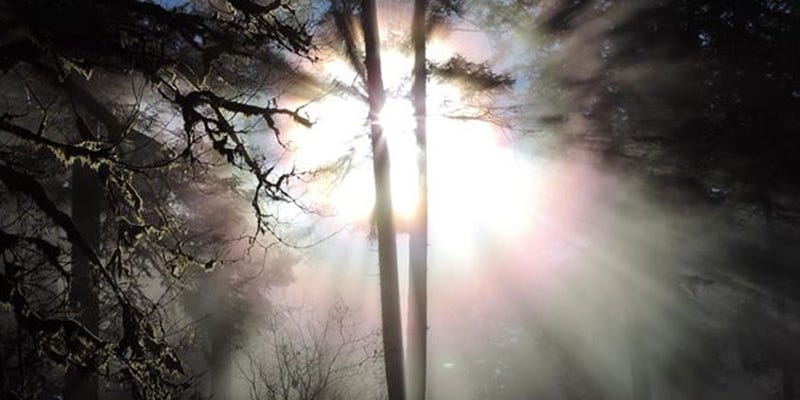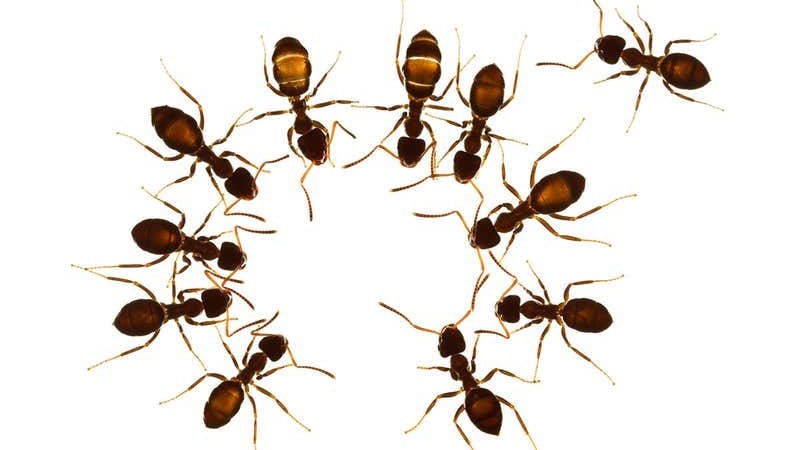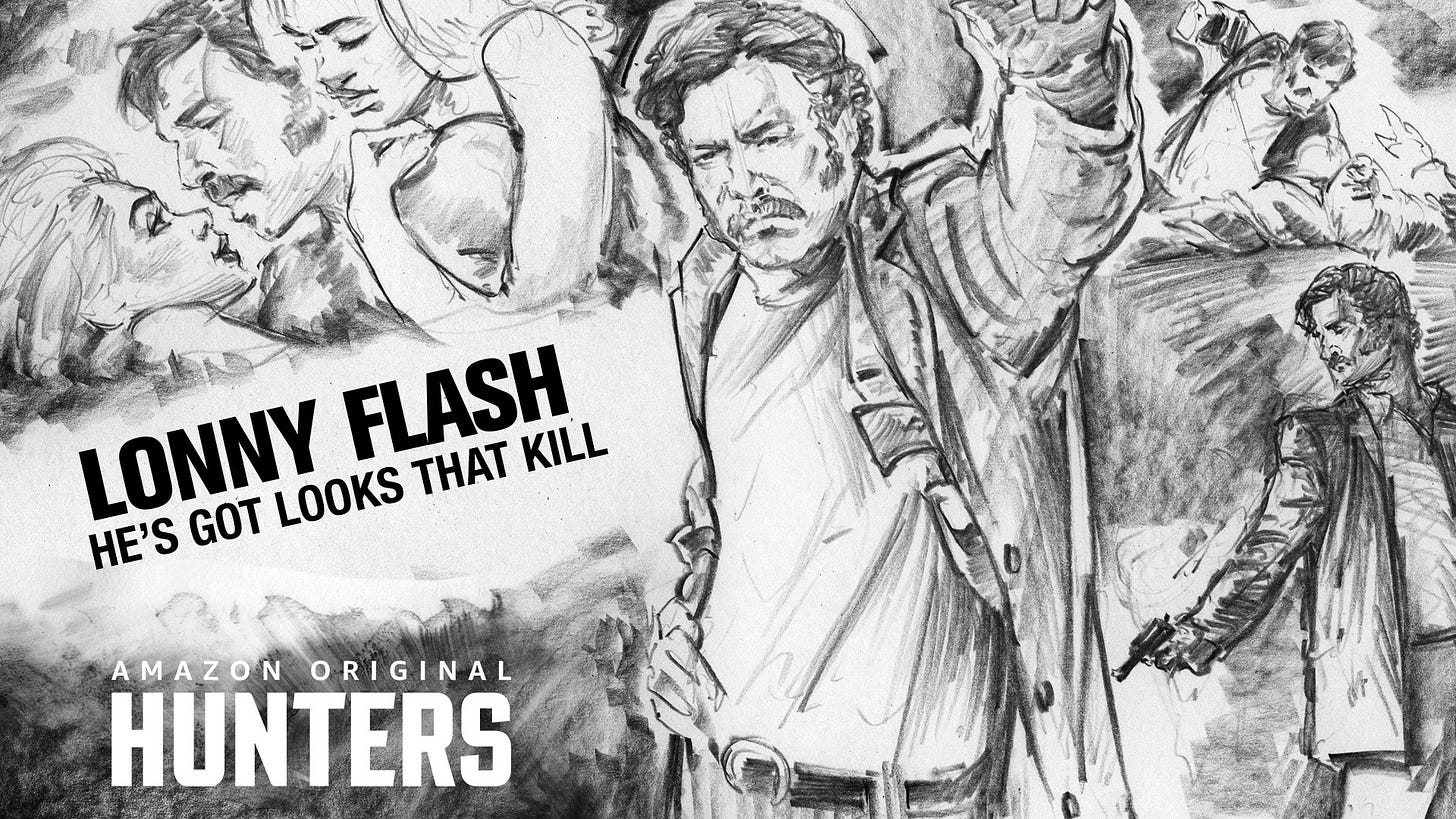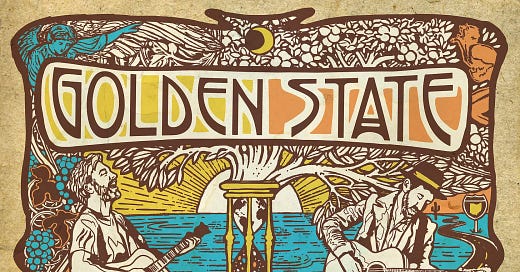MORE & BETTER / HERE & NOW
I recently teared up over a plate of scrambled eggs in New York City.
Jet lag may have played a part as I had flown in from Paris the previous day where I was doing press for "Hunters" (all ten episodes of which are available to stream on Amazon Prime RIGHT NOW!!) But the feeling as the waiter plopped the plate down in front of me was not exhaustion. It was immense and overwhelming gratitude for the simple fact of food, that when I am hungry I can eat. How often do I take this astonishing fact for granted? About three times a day, by my rough estimate.
I wish I could say that this upwelling of gratitude was a regular feature of my life but it’s not. Aside from the rare moment of scrambled-egg-grace, gratitude is not something that comes easy to me. Which is understandable. I was raised in a scarcity culture of 'more' and 'better' (a.k.a. America) Gratitude then is a kind of counterintuitive/countercultural practice, one that requires an intentional willingness to counteract my default setting of dissatisfaction and discontent.
One of the central delusions of my life is the suspicion that some other slightly better life is waiting for me, that with the right tweaks, adjustments, and strokes of luck this life will magically unfold before me. My friend Trent and I have a running joke about a ‘magical supplement,’ a pill that we can take once or twice a day – or some mystical powder we can throw in a morning smoothie – that will at long last have us feeling healthy, wonderful, and settled in our own skin.

Discontent, the feeling that something better might be lurking over the horizon, seems baked into the human experience. What’s come to seem more and more important though is the necessity of telling myself another side of the story. That while, yes, the climate crisis may be hurtling humanity headlong towards the brink of disaster or extinction, it’s also true that meaningful change rarely occurs until we’re faced with no other choice. It’s the famed ‘rock bottom’ of 12-step programs, that our lives are capable of being transformed only when we surrender our ill-begotten schemes and admit our powerlessness. In this pliable, grace-receptive state we are open to guidance from an intelligence far greater than our own.
In “Prometheus Unbound,” Robert Anton Wilson wrote that instability is a requirement for evolution. Ants, he said, are a highly stable species and thus haven’t evolved for millions of years. But humans are highly unstable and we’re evolving at a pretty furious clip. Thus all the individual and collective instability we bemoan is actually, on some level, serving us and nudging us forward. It’s not unlike physical training systems that keep you off balance in order to engage and work unused muscles.
Discontent and dissatisfaction are two muscles that I’ve fully overworked. Gratitude, hope, faith, forgiveness, compassion – I could stand to work those muscles a touch more.

There have been studies done on how much more receptive we are to negative thoughts than positive ones (four times more receptive, actually.) Negative thoughts are like Velcro in our brains; we reflexively grasp negativity and hold it as a truth while being innately suspicious of anything positive. Just do a quick thought experiment around this: How much easier is it for you to believe personal criticism rather than compliments, to feel that what is wrong with you or your life is somehow truer than what might be right? Any actor who has read their own reviews (which I haven’t done for years, I learned my lesson) will tell you that they forget the good reviews almost immediately but can still quote the bad ones verbatim.
The feeling that we’ve done something wrong is called ‘guilt’ and can be healthy and useful (if it doesn’t metastasize.) The feeling that we are wrong, fundamentally and irreparably flawed as a person, is called ‘shame.’ Nothing healthy about that. Also, nothing true about that, no matter what the critical voice in our heads tell us. I learned as a young actor that positive self-talk was going to be the most crucial factor in whether I kept at it or quit. The inner critic in my head was so swift and merciless that I had to find some other voice to counter it. First I had to learn what it was and what it was up to, that the thoughts in my head weren’t ‘me.’ They were programs I picked up along the way, bugs in my system. I came to see that there were other perfectly valid ways to think and be in the world, ones that weren’t so self-punishing and ultimately self-defeating.

There’s no feeling I wish to close myself off to. I’m okay with despair and discontent s long as they're only part of the story. I’ve no interest in blind optimism wherein I close my eyes and heart to the true suffering in the world. Nor am I interested in lazy, cheap cynicism where I feel the fix is in and change is impossible. I can hold both dark and light, while knowing that the light is going to need a bit more attention, care, and time.
Counteracting that self-critical voice requires daily vigilance. Despair and cynicism are always extending a tempting invitation. But I’ve found the rewards of working those other muscles, of telling myself another story, are immense. It serves as a shield against both individual and collective hopelessness. With hope comes faith and aliveness. And with faith and aliveness comes determination and right thinking. I intuitively know what’s being asked next of me. And there’s an effortlessness in the doing whose byproduct is a new kind of joy, that of being used for a purpose greater than myself.
Ben Lee was saying to me the other day (and I'm paraphrasing) that we're clearly in the midst of a grand evolutionary story and it's impossible to know the end of that story, what's really happening to us and what all of it means, while we're in the middle of the story. I really responded to that. My mind wants to pounce on the smallest shred of evidence and weave some grand narrative out of it. But if experience is any guide, I'm mostly drawing erroneous conclusions about things.
Patience and humility are two other muscles that could use a bit more attention. And there's some real relief on the other side of that. For today I don’t have to save the world. Today I don't have to have all the answers. Today I don’t have to heal all my wounds. Maybe just for today I can be grateful for some eggs.

Check out the amazing album cover @jonmarro designed for the new Radnor & Lee record (which is being released May 8 by our friends at Flower Moon Records.) I'm so proud of the album and excited to share it. Ben did a great job describing the album in his latest newsletter so I'm going to defer to him here:
"This is a psychedelic, folky, organic, poetic album produced by my fellow Australian Justin Stanley (Beck, Eric Clapton, Paul McCartney, Leonard Cohen) about getting our hands dirty doing the business of life. Where our early work was a little more detached and philosophical, this collection of songs is full of love, desire, and yearning to be in the parade, rather than to watch it go by.
The first single "Outside In" is PREMIERING RIGHT NOW over on SPIN.com, and they also grilled us so the article also contains a few more juicy morsels about the record...." (It's also streaming/available everywhere else: Spotify, iTunes, Apple Music, YouTube, Amazon, etc.)
****
In other music news I'll playing some of my own tunes (w/Kerenza Peacock) in L.A. at Hotel Cafe's Stage 2 on Wednesday March 4 at 8pm. My pal Ari Tibi is on at 7pm. Should be a great night. Grab tix here.
For an honest and bracing dose of optimism, check out the opening pages of Rob Breszny's "Pronoia" which begins "Thousands of things go right for you every day, beginning the moment you wake up..."
This op-ed that ran in the NYTimes by the actor Brit Marling is a real stunner: I Don't Want To Be The Strong Female Lead.
Adam Sandler's acceptance speech at the Indie Spirit Awards is a masterpiece of the form.
I read this poem, If You Want To Change The World Love A Woman, by Lisa Citore years ago and it stayed with me. I recently reread it and still found it wise and powerful (She also wrote a follow-up: If You Want To Change The World Love A Man)
A delightful interview with the delightful Mary Steenburgen. And this is a lovely piece on her burgeoning career as a songwriter; Mary Steenburgen Thinks You Are Capable of Growth.
It feels like an extra limb: Musicians on the bond with their instruments.
Ram Youssef's HBO special "Feelings" made me feel many things, mostly delight. It's extraordinary. Also: some really funny stand-up from Sam Morril.
John Fugelsang wrote a heartbreaking Twitter thread about the death of his friend Jennifer Summer. He linked to her obituary and urged everyone to read it. I never met Jennifer but I feel like I have after reading this.
My father texted me something he came across a few days ago:
As for being frustrated because you continue to make mistakes, don't worry about it. I once watched Itzhak Perlman play a phenomenal piece on one of the late night shows (Carson? Letterman?) After he was done, the host asked him how he could play all those notes without making any mistakes. His answer was that he had made at least seven mistakes during that performance. The host said that he had not noticed any mistakes. Itzhak answered, "That is because I played them with confidence."
And hey: One more nudge to check out Hunters on Amazon Prime. All ten episodes are up and available to stream. It's a warped, weird, and wonderful show about so many things and I'm grateful I get to be a part of it.

As always, if you're enjoying these please spread the word (people can sign up here) And if you're new to these check out past Museletters. JR




